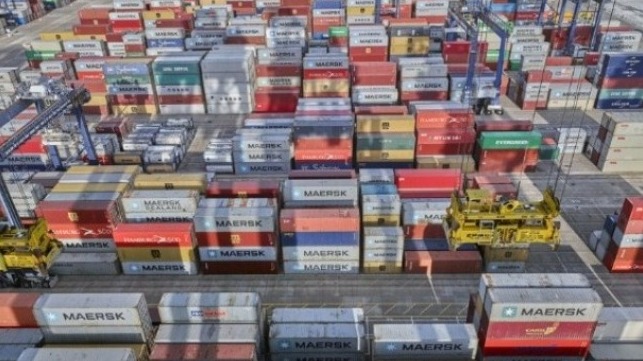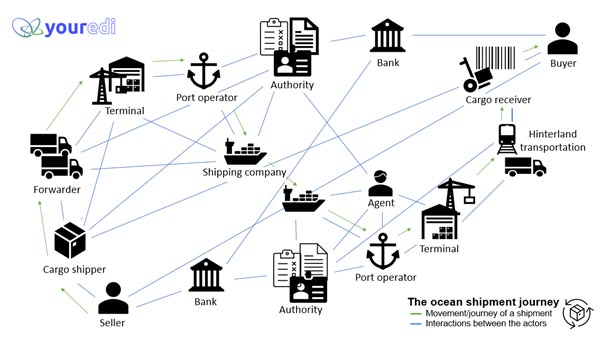Integration Solutions Increase the Efficiency of Ocean Logistics

Ocean shipping is the most popular method of delivering products overseas today. However, the efficiency of ocean logistics is way below its potential. In this article, we explain the reasons for that inefficiency and how modern integration solutions can overcome them.
Due to the ongoing COVID19 pandemic, many of us avoid close contact with people and prefer to stay at home as much as possible. Fortunately, the Internet and mobile technologies are tightly embedded in our lives, allowing us to buy goods without leaving our homes.
Online marketplaces and stores provide us with services to track the status of ordered goods and change those on the fly. All these affect our consumer behavior and make us take a high level of customer service for granted. When something goes wrong, and the delivery on the promised date and time is impossible, we become unsatisfied, provide one-star ratings and write reviews in which we suggest ourselves and the rest of the Internet never buy from this seller again.
In today's harsh business reality, unhappy customers are a real threat to many companies' business success. To cope with this issue and ensure the highest level of customer satisfaction and an outstanding level of service, businesses must ensure efficient logistic operations.
Businesses constantly demand improvements in logistic companies' performance to whom they outsource logistics tasks. Logistics companies, in their turn, maximize their supply chains' performance and work only with partners that can ensure an adequate exchange of information vital for better supply chain planning.
Since shipping goods by sea is the most popular method of delivering products overseas, ocean logistics has become a key global supply chain element. Visibility on an ocean shipment and meeting partners' requirements regarding information exchange has become crucial for all actors of the ocean logistic sector. Unfortunately, due to the industry's nature, many actors encounter significant challenges, which leads to poor performance and causing inefficiencies in the industry.
The Nature of Ocean Logistics and the Reasons for its Inefficiency
Although the ocean logistics industry is usually considered a well-organized system, it is a fragmented environment composed of various actors. An ocean shipment journey depicted in diagram 1 demonstrates the complexity of moving a shipment by sea from one point to another.

Diagram 1. The ocean shipment journey
Analyzing the diagram, we can see all the steps and interaction points where partners must communicate. However, due to a difference in the level of technologies involved parties utilize, those communications are often challenging.
This happens because exchanging information between actors happens in a manual mode or with the help of legacy technologies that are unreliable, labor-intensive, and inefficient. They are often based on ANSI X12, EDIFACT, or in-house proprietary formats that typically are variations of the two mentioned above.
Although EDIFACT is the most widely used messaging format in ocean shipping today, dealing with it implies restrictions and limitations that often lead to inadequate or missing data.
The situation is aggravated by the fact that historically involved parties have been competing and lacked cooperation and willingness to work towards the common good. As a result, there is no interoperability between the in-house data standard that actors have in place. Plus, none of those are suitable for a direct exchange of information or interaction with modern APIs becoming so popular today.
Despite the apparent drawbacks, companies still heavily rely on their systems due to significant infrastructure investments made over several previous decades. The exchange of business documents such as ocean bookings, booking confirmations, sailing schedules, shipment status updates, or invoices between industry stakeholders is cumbersome and hard to implement, which slows all processes and drags the industry's performance down.
Overcoming these issues will let industry stakeholders improve their communications and interoperability and achieve greater transparency and visibility across the entire ocean shipment journey, ultimately leading to increased efficiency of the industry.
The Initiatives Aiming to Help Overcome the Challenges
Nowadays, to improve the situation with common standards and free the industry from its heavy reliance on EDI (electronic data interchange) technologies, several organizations have taken the initiative in establishing common rules for data exchange and communication. Today's most prominent is the Digital Container Shipping Association (DCSA), a consortium of the largest container shipping companies established in 2019. As clear from the name, the association promotes digitization to consolidate the industry and improve data exchange between the actors.
Up for today, besides the blueprint enabling a common language for the container shipping, DCSA has published these standards: Track and Trace (T&T) standards helping to track container journey, the standard for operational vessel schedules (OVS) enabling automatic data exchange between carriers and operational service providers, Load List and Bay Plan definitions easing communication of container load volumes and stowage details between VSA (vessel sharing agreement) partners, terminals and ports, Just-in-Time (JIT) Port Call program helping improve schedule reliability, and the most recent initiative aiming to facilitate acceptance and adoption of an electronic bill of lading (eBL).
Besides the standardization initiatives, we can also see an increasing number of digital platforms, community systems for supply chain visibility, and apps aiming to help consolidate the industry and foster data exchange between the actors. Excellent examples of such innovative offerings are XLOG, NYSHEX, and TradeLens. While the first two represent digital platforms that facilitate booking processes and provide shippers, brokers, and carriers with real-time freight visibility and centralized information, the TradeLens ecosystem enables true information sharing and collaboration across the entire supply chain, allowing for tracking and managing end-to-end shipments.
An efficient supply chain implies parties' involvement that can synchronize their actions and exchange information about the shipping progress with each other in near real-time. All those companies relying heavily on paperwork and other error-prone and outdated technologies will most likely have challenges getting market shares or even being out of the game soon. Those companies who realized the need for a smarter way of doing business and started digitalization and adopting the mentioned above initiatives and platforms will grow their businesses further and prosper.
With Every Opportunity Comes a New Challenge
Undoubtedly, the initiatives regarding the unification of the industry's standard and ongoing digitalization provide new opportunities and lots of value for the industry and its actors. However, adoption still requires a certain level of knowledge and know-how. To enjoy the benefits of being DCSA compliant or integrated with digital communities and platforms, the actors still need to make significant efforts.
Adopting new standards or integrations with new systems almost always implies significant changes to the existing IT and data integration solutions. Such changes always go hand in hand with huge investments in hiring and managing a team of integration experts who possess the required skills and do the job. Due to the unclear timeline and risks associated with such projects, companies prefer partnering with data integration professionals instead of doing integrations themselves.
Such partners provide integrations as a service, meaning a well equipped and experienced team will take care of the required integration and maintenance. Due to a sharp focus on a particular sector, integration experts have the required expertise and best practices in-house, allowing them to accomplish integration projects in a short while with no risks of failure. The solutions they offer often have a form of an additional layer running on a cloud platform designed to work with many formats and protocols common for the ocean logistic sector. Designed to complement the customer’s existing systems, such solutions imply no change in how the client's IT systems work.
Youredi is one of such providers who offer cloud-based integration solutions focusing on global supply chains and logistics. The company has helped stakeholders of the industry overcome some of their major obstacles related to bookings, schedules, eVGM, and container tracking for many years. Today, Youredi is the leading provider of managed integration solutions for the industry.
Besides complex enterprise solutions enabling bridging of EDI and API worlds, Youredi offers a set of predefined managed services allowing actors of the industry to solve many issues related to ensuring data of required quality, transforming data to the expected standards, data aggregation from multiple internal and external sources, extending the functionality of main IT system (TMS, TOS, etc.) by integrating functionalities from external applications and many others.
Besides that, being an official partner of TradeLens and facilitating the expansion of DCSA's standardization initiatives, Youredi also offers true SaaS connectivity solutions enabling rapid integrations with the platform (whether you are a data contributor or data consumer) and solutions enabling you to enjoy the benefits of the unified industry standards developed by DCSA without changing your system.
These services are offered under Youredi Rapids' name and imply predictable, fixed monthly pricing with no long-term commitments.
Choosing Youredi's solutions, industry stakeholders can address specific use cases and solve common industry pain points without committing to expensive software suites or in-house development projects.
Please visit Youredi's website to learn more about the company or the services it provides.
The opinions expressed herein are the author's and not necessarily those of The Maritime Executive.
